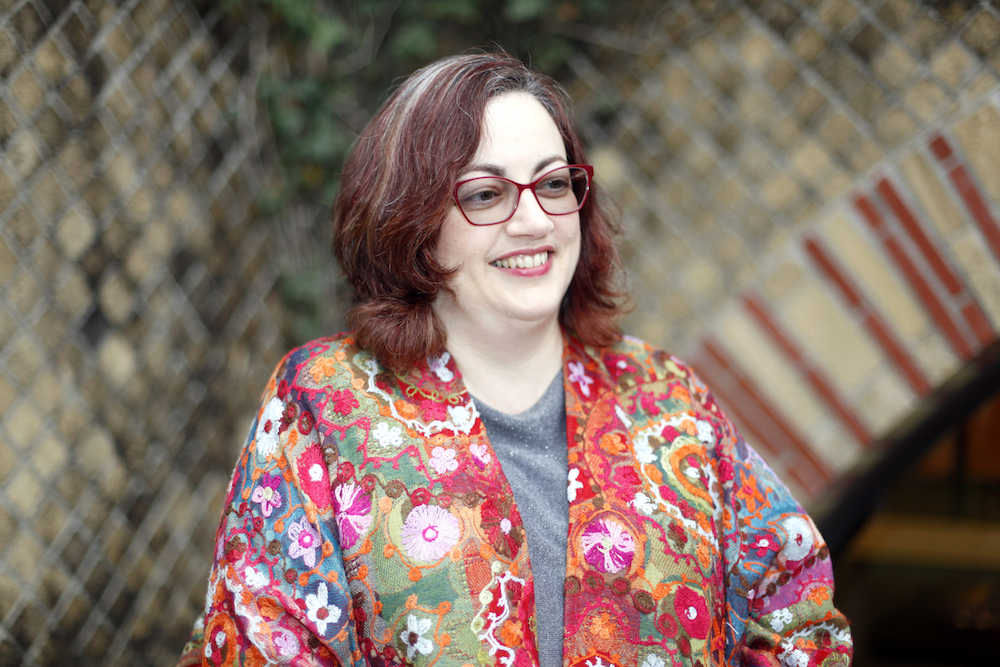
Photo by Aaron Salcido.
Helen Morales is a classicist and cultural critic at the University of California, Santa Barbara. She chairs the university’s Hellenic Studies Committee and is the editor of the journal Ramus. Her most recent book is Pilgrimage to Dollywood. Prior to joining a Zócalo/Getty Villa panel titled “What Can the Ancient World Teach Us About Feminism?” she spoke in the green about her favorite myth, the importance of studying the ancient world, and what she does to decompress.
You studied and taught at the University of Cambridge. What do you miss about Cambridge, England?
The National Health Service. Some wonderful colleagues and friends. And being able to wear leggings and a T-shirt—they dress down in Cambridge, much more than in American institutions.
What is one thing we misunderstand about the ancient world?
I think we can fall easily into idealizing or vilifying the ancient world. So, the Golden Age of Greece and the corrupt orgy-throwing moments would be examples of that. It’s as hard to generalize about the Greeks and the Romans as it is to, say, generalize about Americans or Californians.
Why do you think it’s important we study the ancient world?
There are many answers to that. It’s a cliché, but I think it’s important and true that if we don’t know history, we’re doomed to repeat it. I think Cicero said something like, “ If we don’t know our past, we remain a child,” which is a nice way of putting it. But more than that, I think it gives a different vantage point from which to look on our own world. [Also] it’s important we understand and preserve other cultures, and not doing that leads to parochial, political thinking, xenophobia, and so on.
What’s your favorite Classical myth?
They change, but my favorite one at the moment is a less well-known one told by Ovid in which King Earth-Ripper—as his name translates—defiles the environment, defiles a sacred place. It’s a myth in which defiling the environment is bound up with the sexual abuse of his daughter and ends up with him eating himself. And I think for a parable of modern time, it’s a pretty good one. That’s in Ovid’s Metamorphoses.
What’s your guilty TV watching pleasure?
I like catching up with things on British TV through Acorn TV. I’ve been watching Fleabag and Line of Duty.
What’s your favorite place to eat in Santa Barbara?
Anywhere with a view. I’m lucky enough to have a friend who’s a local chef. Her name is Pascale Beale. Anything that she cooks, in her garden.
What’s the best book you’ve read in the past year?
There are many, but I’m particularly struck by a new book by Inua Ellams, and it’s called The Half-God of Rainfall. It uses ancient myth to talk about female rage, and it’s brilliant.
What teacher or professor changed your life, if any?
Can I have two? I was a first-generation student at Cambridge University and really fortunate to have two extraordinary teachers. One is M.M. McCabe, who’s an ancient philosopher who’d explain Plato by talking about wombats and elephants and would make it explicable and fun. And the other is John Henderson, who’s a Latin literature professor and really taught us how to think. So, both of them. The emphasis was on critical thinking, and I’m grateful for that every day.
What year, past or future, would you time travel to if you could?
Whilst I would like to have been a fly on the wall at, say, when Cleopatra was fighting a battle, something like that, I wouldn’t want to go back there. I’d go to the future and see, with some trepidation, whether it turned out to be as bad as it looks.
What do you do to decompress?
I’m bad at decompressing. Seeing friends, hanging out with friends, I love doing. And then when I really need something other than work, because I’m a workaholic, I will cross-stitch obscene and snarky things.
What museum do you most admire?
I don’t have a particular museum, but I admire museums where there’s real, full attention paid to the labeling, and where there isn’t crude justification of items that have been taken illegally. I should say the Getty. I should also say I admire the Getty for doing things like this public event. I think of it as a kind of extraordinary space, but it’s also a museum.
What do you consider beautiful?
If I answer that as an ontological question, that will get us into all kinds of philosophical—we’ll be here all night. As I get older, I appreciate the basic things more. Kindness, the pursuit of excellence. Family, I guess, as well. My daughter. She’ll cringe if I say I think she’s beautiful.
What word or phrase do you use most often?
I have no idea. I guess where I catch myself using phrases, British colloquialisms, that baffle my students. So, I’ll say things like “naff.” Do you know what that means? So, it doesn’t translate, it’s… “bad taste” is too judgmental, it’s not a judgmental term. “Kitschy” is too aesthetic of a term. There’s no equivalent, but I know I use those frequently because people will look at me in a baffled way. So something’s “naff,” or somebody’s “bonkers.” Does that translate? Okay, a little bit more. Or “faff around,” “don’t faff around,” which means “don’t dilly-dally.” That probably doesn’t translate as well, but those kinds of terms.



